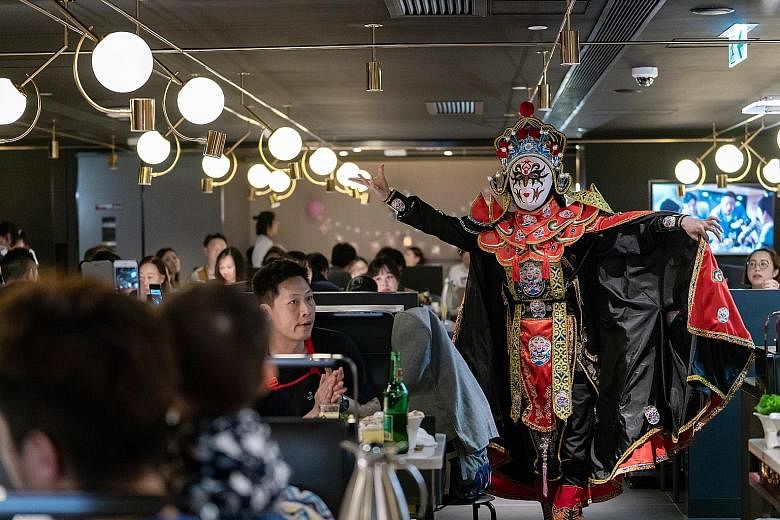SHANGHAI • China's largest hotpot chain, whose co-founders are among Singapore's newest billionaires, is whetting the appetite of investors as well as diners.
Haidilao International Holding, one of the largest additions to the MSCI Emerging Markets Index by market capitalisation, has surged more than 78 per cent since its Hong Kong listing last September. The Hang Sang Index slipped about 8.5 per cent in the same period.
Analysts believe there is steam left in this rally: the 12-month consensus target price of HK$33 is about 4 per cent above the stock's current level. It gained as much as 2.4 per cent in early Hong Kong trading yesterday.
Haidilao's co-founders are the latest entrants to Forbes magazine's list of Singapore billionaires this year. Mr Zhang Yong, 48, is the Republic's third-richest person with a net worth of US$6.8 billion (S$9.4 billion). His wife, Ms Shu Ping, 49, is ranked 14th with a net worth of US$1.8 billion. The couple are Singapore citizens, according to Forbes.
The Sichuan-based firm is the market leader in hotpot in China, a segment that accounts for almost 14 per cent of the country's US$21 billion restaurant scene, according to data from Frost & Sullivan.
The lack of listed rivals - there is only one other hotpot stock, Xiabu-xiabu - has added to its lure, prompting comparisons with Kweichow Moutai, the world's most profitable distiller whose fiery drink is coveted and hard to procure.
The projected rapid growth of hotpot in China is expected to benefit Haidilao by shoring up its front runner status, said analysts. Frost & Sullivan projects hotpot chains to grow 10.2 per cent by 2022 to reach revenue of over 700 billion yuan (S$140 billion), outpacing the restaurant industry as a whole.
"The hotpot market in China is still extremely fragmented," Mr Arnold Tam, Hong Kong-based analyst at Bright Smart Securities, said in an e-mail. "Haidilao's market share is expected to rise as the industry evolves towards strengthening the strongest players."
Although the Chinese economy is growing at its slowest pace in three decades and consumer confidence is waning, the food industry is relatively insulated. Amid a sluggish world economy and geopolitical uncertainty, Haidilao's revenue is projected to grow 60 per cent this year and 40 per cent next year, according to analyst estimates compiled by Bloomberg.
Customers are willing to queue for hours to get a table at one of its over 500 outlets in China, encouraged by perks such as free manicures, shoulder massages and dance performances. The restaurant chain also has a delivery service that sends a pot, an induction cooker and fresh food to customers at home.
The chain's revenue nearly tripled in the past three years to 17 billion yuan last year, while profit climbed more than 500 per cent to 1.7 billion yuan in the same period, according to data compiled by Bloomberg.
In comparison, revenue at Xiabu-xiabu Catering Management China Holdings - the other Chinese hotpot stock - doubled over the same period while profit rose 63 per cent.
Haidilao buys most of its food supplies and seasonings from affiliated companies, which demonstrates strong control over its supply chain, analyst Yanqing He of China Securities Finance Corp wrote in a note last month.
It has also managed to lower employee turnover through its incentive system, which includes paying up to 2.8 per cent of a restaurant's profit to store managers.
Its fortunes were also helped by a food safety scandal at rival Xiabuxiabu in September last year, when a Shandong province customer allegedly found a rat in a hotpot, causing shares to fall. Xiabuxiabu had contested that allegation after an internal preliminary probe.
Haidilao is also expanding overseas. In April, it opened a London outlet, bringing its tally of restaurants outside China to 46.
Still, the enthusiasm around its stock has made it increasingly expensive. It is trading at around 57 times projected earnings for the next 12 months, while Xiabuxiabu is at 20 times. Guangzhou Restaurant Group, a Cantonese restaurant chain operator, trades at 28 times.
"At this expensive level, it's easier for the stock to fall than to rise," said analyst Ruoyu Wen of Beijing HeirCastle Asset Management.
BLOOMBERG

